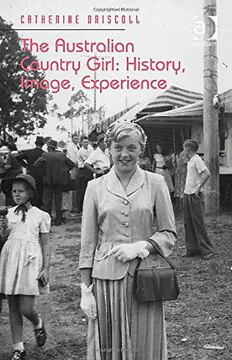
The Australian Country Girl: History, Image, Experience PDF
Preview The Australian Country Girl: History, Image, Experience
The AusTrAliAn CounTry Girl: hisTory, imAGe, experienCe For my mother, Judith Mary Driscoll, and all the other country girls The Australian Country Girl: history, image, experience CATherine DrisColl University of Sydney, Australia © Catherine Driscoll 2014 All rights reserved. No part of this publication may be reproduced, stored in a retrieval system or transmitted in any form or by any means, electronic, mechanical, photocopying, recording or otherwise without the prior permission of the publisher. Catherine Driscoll has asserted her right under the Copyright, Designs and Patents Act, 1988, to be identified as the author of this work. Published by Ashgate Publishing Limited Ashgate Publishing Company Wey Court East 110 Cherry Street Union Road Suite 3-1 Farnham Burlington, VT 05401-3818 Surrey, GU9 7PT USA England www.ashgate.com British Library Cataloguing in Publication Data A catalogue record for this book is available from the British Library The Library of Congress has cataloged the printed edition as follows: Driscoll, Catherine. The Australian country girl : history, image, experience / by Catherine Driscoll. pages cm Includes bibliographical references and index. ISBN 978-1-4094-4688-0 (hardback) – ISBN 978-1-4094-4689-7 (ebook) – ISBN 978-1-4724- 0109-0 (epub) 1. Rural girls–Australia. 2. Rural women–Australia. 3. Country life–Australia. 4. Rural-urban relations–Australia. 5. Women–Australia–Identity. 6. Sociology, Rural–Australia. I. Title. HQ792.A85D75 2014 3.05.40994–dc23 2014005354 ISBN 9781409446880 (hbk) ISBN 9781409446897 (ebk – PDF) ISBN 9781472401090 (ebk – ePUB) V Contents List of Illustrations vii Acknowledgements ix Introduction: ‘The Australian Country Girl’ 1 Part I assemblIng australIan Country gIrlhood 1 Becoming a Country Girl (Gough, Kate, the CWA, and Me) 17 2 Miss Showgirl (Rural Girlhood and Representation) 37 Part II hIstory, Image, exPerIenCe 3 The Bush-Girl (a Pastoral) 63 4 The Country Town Girl (a Soap Opera) 89 Part III PlaCe and PraCtICe 5 Subjects of Distance: (Country) Girl Culture Capital 113 6 Home Economics (Nowhere to Go, Nothing to Do) 137 7 Ex-Country Girls (a Human Geography) 161 Bibliography 179 Index 193 This page has been left blank intentionally list of illustrations I.1 Family photograph, Ada Sheather, c.1928. © C. Driscoll 3 2.1 Family photograph, Peggy Sheather at The Show, c.1951. © C. Driscoll 49 2.2 Family photograph, Judith Sheather on Skettie at Ellenborough Gymkhana, with Anne Duffy, c.1960. © J. Driscoll 55 3.1 Rex Dupain, Girl by the Pool, 1996. © Rex Dupain 70 3.2 ‘The Girl Who Found the Moon.’ Cover of Mary Grant Bruce, The Stone Axe of Burkamukk, 1922 (London: Ward, Lock & Co.). © Orion Publishing Group 77 3.3 George Lambert, The Squatter’s Daughter, 1923–1924. Oil on canvas. National Gallery of Australia, Canberra. Purchased with the generous assistance of James Fairfax AO and Philip Bacon AM and the people of Australia in 1991 79 4.1 Television still. Vicky and Simon, A Country Practice, 1981. Channel ATN7. © JNP Productions 98 5.1 Film still. Freya and Danny, The Year My Voice Broke, 1987. © Kennedy Miller Mitchell 129 This page has been left blank intentionally Acknowledgements The research for this book was funded by the Australian Research Council: centrally through a Discovery Project on Australian country girlhood (2004–2007). Before that a Small Grant (2000–2001) helped establish the premises of this project and, later, a collaborative Discovery Project on cultural sustainability in Australian country towns (2009–2013)—shared with Kate Bowles, Kate Darian-Smith, Chris Gibson, David Nichols and Gordon Waitt— materially contributed to its final form. A version of Chapter 1 has previously appeared in Mary Kearney’s edited collection on Mediated Girlhoods (Driscoll 2011) and an essay based on Chapter 4 appeared in the journal Cultural Studies (Driscoll 2012). I want to particularly thank Claire Jarvis at Ashgate for her interest in this project and her patience while I wrote and rewrote it. I wanted this book to give a primary place to country girls’ lives and yet not claim to fully represent them; to be neither overwhelmed by theoretical discussion nor overly simplistic. Claire made my best attempt at that juggling act possible. It was initially difficult to accept that as I was writing for an academic readership I was inevitably writing about the people I met during this research in ways that would seem alien to most of them. I have tried to be responsible to many stories of Australian country girlhood here, including my own, but I know that I have nevertheless written a book in which we have all become examples. Since 2003 many people have contributed to this work, most materially the country girls and ex-country girls who were collectively my most important resource. In keeping with ethical commitments for my fieldwork I have taken care not to identify participating individuals or groups in what follows except by pseudonyms. I have also given pseudonyms to the locations in which I worked, given that in smaller communities only a little specificity works to identify people. This means, however, that I can only issue a general thanks for the hospitality and generosity with which people mostly met my interest in their ideas about and experiences of Australian country girlhood. I owe warm thanks to the Department of Gender and Cultural Studies at the University of Sydney. I am especially grateful there to Elspeth Probyn, who urged me to take on this project when I felt it would be too personally challenging; to Meaghan Morris, who has shaped my thinking on all the questions it raised; and to Tess Lea, who helped immeasurably with problems in the final stages. For advice and feedback along the way I am also grateful to Andrew
